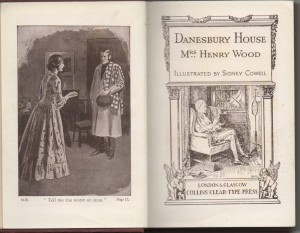Tomorrow’s NRG visiting speaker is Pam Lock (University of Bristol) who will be discussing Ellen Wood’s Danesbury House (1860) as a vital link within the history of sensation and temperance fiction (abstract below).
This will be held at 4pm in F309 and as usual we will adjourn to Dylans afterwards and then into the centre for food – all very welcome!

‘The sensational temperance of Danesbury House; situating Ellen Wood’s “thrilling” anti-alcohol novel in the evolution of sensation fiction’
Abstract
Published in February 1860 by the Scottish Temperance League, four months after the first episode of The Woman in White appeared in All the Year Round, Danesbury House, brought together two seemingly incongruent genres; temperance and sensation fiction. Despite its consistent popularity during the latter half of the nineteenth century, little modern criticism of substance has been written on Danesbury House with the exception of Marie Riley’s densely researched chapter ‘Writing for the Million: The Enterprising Fiction of Ellen Wood’ (2004). Given the number of comparable contemporaneous novels that are being plucked from obscurity by critics and celebrated by new publishing houses such as Catherine Pope’s Victorian Secrets, it is time for a reappraisal of Ellen Wood’s first novel, Danesbury House.
This paper will examine Danesbury House as an important link in the evolution and history of sensation and temperance fiction. I am particularly interested in the conflicts and symbioses of these two ideologically incongruent genres in the context of their divergent moral and socio-cultural aims.
Bio
I am a part-time PhD student at the University of Bristol, UK (2012- ). The working title of my thesis is ‘The Socio-cultural Connotations of Alcohol in Victorian Fiction’. I have been exploring the topic of alcohol’s representation in Victorian fiction since giving a paper on Stevenson’s use of rum in Treasure Island at the ‘Drink and Colonialism’ workshop run by the University of Bristol’s Centre for the Study of Colonial and Post-Colonial Societies (2010). This small but enjoyable project inspired me to develop the topic for my MA dissertation (2011) to a study of the representation of alcohol in the fiction of Robert Louis Stevenson. The PhD project surveys a broader chronological span, and examines a range of authors and texts including Braddon, the Brontës, Collins, Dickens, Eliot, Hardy, Kipling, Stevenson, Trollope, and Ellen Wood.